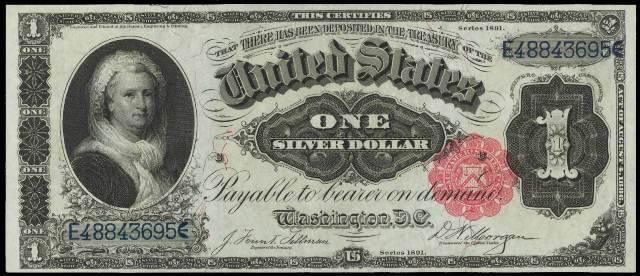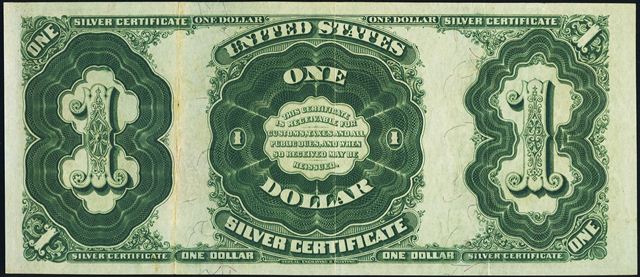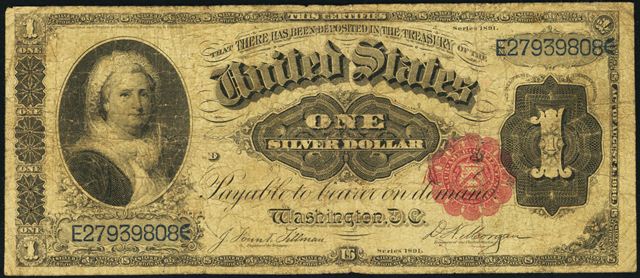Series of 1891 $1 Silver Certificate – Martha Washington
History: One dollar silver certificates were first printed in 1886 and discontinued in 1957. All silver certificates were redesigned in 1891 when a new series was issued. We are specifically looking at the series of 1891 $1 silver certificate for this guide. Just like in 1886, one dollar bills from 1891 feature a portrait of Martha Washington on the left hand side of the bill. The new design element had a more open reverse. All 1886 silver certificates have a rich and highly detailed green back. All 1891 $1 silver certificates have a red seal. The previous issues from 1886 could have four different types of seals. Most of the design and words on the bill are still the same between the two years.
Nickname: The 1891 $1 silver certificate is like many other pieces of large size currency. Its nickname derives directly from the person featured on the bill, which in this case is of course Martha Washington. So collectors refer to this issue as a “Martha” or an “1891 Martha” to help distinguish them from the 1886 series. 1886 $1 silver certificates are typically called “Ornate Marthas” because they have a unique green back that is different from the 1891 series.
Other Facts: One of the most interesting facts about the 1891 $1 silver certificate is that it and the 1886 example are the only two pieces of United States paper money to ever feature a woman as the main portrait. It is hard to believe that over 120 years later we still haven’t found another female besides Martha Washington to put on our paper money. Pocahontas and other nameless women have been shown as part of vignettes, but no other woman has been the main portrait. The United States is definitely behind the rest of the world when it comes to using female leaders on their currency. We should mention that it is illegal for a living person to be featured on a piece of United States currency. However, there are still plenty of women who should be considered the next time money is redesigned.
Values and Grading: 99% of the value of an 1891 $1 silver certificate is based on the condition of the note. No star notes were issued for the series. There were only two signature combinations used. Your $1 bill will either be signed by Rosecrans and Nebeker or Tillman and Morgan. Both signature combinations have the same value. There are also no seal varieties. So the only wildcard factor would be a low serial number. Any number under 100 is considered low. There are some low numbers known to exist, but we don’t see them frequently. It takes time to learn how to accurately grade paper money. Our guide below has pictures and prices for a few different 1891 $1 bills. Please contact us if you need more help pricing yours.
Choice Uncirculated or Better: The 1891 $1 silver certificate we have pictured is what you expect to see for a high grade note. The paper is bright white. There are absolutely no folds. The seal is bright red and the other colors and paper are both crisp. Most 1891 $1 bills that look like this are worth around $1,500. Some can be worth a little bit more if they have great centering. Remember that at first glance a lot of Marthas will look this way. You have to really examine these notes critically. Anything that looks like a blemish or fold probably is just that and it will lower the value, sometimes significantly.

This Beautiful 1891 $1 Silver Certificate Should Sell For Around $1,500
Extremely Fine to About Uncirculated: Most 1891 $1 silver certificates in this grade range sell for between $500 and $1,000. The note we have pictured has three really hard fold lines. That is very typical for the XF 40 grade. We generally expect a note in the XF 40 or XF 45 grade to have two or three folds. Notes in the AU grade should only have one fold. This grade range is somewhat elusive for the type. Tens of millions of 1891 $1 bills were printed. Most either circulated very heavily or not at all, leaving few with only minor signs of wear.

You Can See Three Hard Vertical Folds On This 1891 $1 Bill
Fine to Very Fine: We see lots of Marthas in the fine and very fine grades. A problem free 1891 $1 silver certificate is always in demand. People collecting the type or denomination want something pleasing that isn’t going to cost more than a few hundred dollars. For $300 you can buy a really nice looking note in very fine 25 condition. For $100 less you can get a nice fine, or for $100 more you can get a really attractive very fine 35. The 1891 $1 bill we have pictured is actually pretty rough for the grade. Most others will have better color and brighter paper.

This 1891 $1 Silver Certificate Should Be Worth Around $200
Very Good and Lower: Our very good 1891 $1 bill has been graded as a 10 by a third party grading service. At first glance it does not look very different from the fine example we have pictured above. However, look at how the fine note is “holding” the folds. That means that the paper is stronger. The very good example is much softer. You can also tell that the margins on the very good example are not great. They are a little bit dinged up. The paper is equally dark. Generally speaking, notes in the 1-10 (out of 70) range are going to look worse than what we have pictured. Expect to find tears, tape, stains, and other undesirable condition issues. Most of these 1891 $1 silver certificates can be bought for around $75.

1891 $1 Bills In This Condition Are Common And Usually Worth Around $75
Need an Appraisal or Offer? We are looking to buy any and all 1891 $1 silver certificates. Just send us some scans or digital photos of the front and back of your bill and we will get back in touch with you shortly with a free appraisal and our best offer. Sales@AntiqueMoney.com


